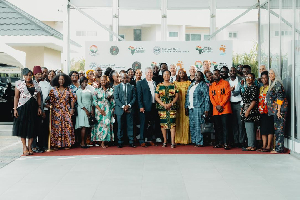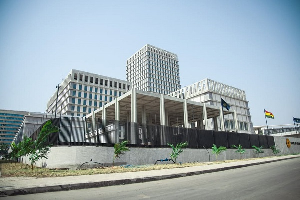I am so fascinated by the writings of Walter Rodney to the point where I begin to wonder if our policy makers do research at all. Dr Kwame Nkrumah of Ghana envisioned this exploitation of our natural resources over 50 years ago. I believe it is important for the Ghanaian policy makers to come up with policies that aim at benefiting Ghanaians just as Botswana has done remarkably under former president Sir Quett Ketumile Joni Masire and has since continued with it.
African, Caribbean and some Asian countries are unjustifiably referred to as developing, in other words, third world countries. Going by the western definition of the status of these countries, they are underdeveloped and less intelligent.
“Underdevelopment makes sense only as a means of comparing levels of development. It is very much tied to the fact that human social development has been uneven and from a strictly economic viewpoint some human group have advanced further by producing more and becoming wealthier.”
It is possible to compare the economic conditions at two different periods for the same country and determine whether or not it had developed; and it is possible to compare the economies of any two countries at any given period in time.
A second and even more indispensable component of modern underdevelopment is that it expresses a particular relationship of exploitation: namely, the exploitation of these so called underdeveloped countries by the western or developed countries. All the countries named as “underdeveloped” in the world are exploited by others; and the underdevelopment with which the world is now preoccupied with is a product of imperialist, capitalist and colonialist exploitation. African and Asian societies were developing independently until they were taken over directly or indirectly by the capitalist powers. When that happened, exploitation increased and the export of surplus ensued, depriving the societies of the benefit of their natural resources and labour. That is the concept of underdevelopment in the contemporary sense.
It is typical of underdeveloped economies that they do not concentrate on those sectors of the economy, which in turn will generate growth and raise production to a new level altogether. The ‘underdeveloped economy’ prefers to import quantity ‘technology’ at the expense of quality.
Furthermore, whatever savings are made within the economy are mainly sent abroad or are frittered away in consumption rather than being redirected to productive purposes. Much of the national income which remains within the country goes to pay individuals who are not directly involved in producing wealth but only in rendering auxiliary services- e.g. bloated ministerial appointments, special assistants and party functionaries. What aggravates the situation is that, these people do not reinvest in agriculture or industry. They squander the wealth created by the peasants and workers by purchasing flashy cars, buying air tickets for their lovers to travel abroad, launder these monies, luxurious homes, extravagant birthday parties, whisky and perfume and what have you. Many more figures of that sort indicate that in describing a typical underdeveloped economy it is significant to point out the high disproportion of the locally distributed wealth that goes into the pockets of a privileged few. Taxes do not produce national wealth and development. Wealth has to be produced out of nature- from tilling the land or mining metals or turning raw materials into finished products for human consumption. These things are done by the vast majority of the population who are peasants and workers. There would be no incomes to tax if the labouring population does not have jobs.
In fact, it can be shown that the underdeveloped countries are the ones with the greatest wealth of natural resources and yet the poorest in terms of goods and services. The United Nations Survey of Economic Condition in Africa (1964) states that “Africa is well endowed with mineral and primary energy resources…” however the reality is that Africa has not come anywhere near to making the most of its natural wealth. Most of the wealth now being produced is not being retained within Africa for the consumption of Africans. Foreign earnings are used to import goods and services or used to service foreign loans. Are the supposed developed world justified in referring to Africa as underdeveloped?
Underdevelopment is justifiably a paradox. Realising this the so call developed economies euphemistically describe Africa as developing: Many parts of the world that are naturally rich are actually poor and parts that are not so well off in wealth of soil and sub-soil are enjoying the highest standard of living. Who except God can explain this Oedipus paradox?
There again lies the canker that the people of Africa have gone through a cultural, social and psychological crisis and have accepted the European version of things. In other words the African himself has doubts about his capacity to transform and develop his natural environment. With such doubts, he even challenges those of his brothers who say that Africa can and will develop through the efforts of its own people.
Walter Rodney tells us that “when the “experts” from capitalist countries do not give a racist explanation, they nevertheless confuse the issue by giving as causes of underdevelopment the things which are consequences. For example, they would argue that Africa is in a state of backwardness as a result of lacking skilled personnel to develop. It is true that because of lack of engineers Africa cannot on its own build more roads, bridges and hydroelectric stations. But that is not a cause of underdevelopment, except in the sense that causes and effects come together to reinforce each other.” In other words, that is the effects of exploitation by the imperialists and colonialists with the complicity of the greedy, corrupt, arrogant and heartless African leaders who have no sympathy for their people.
Mistaken interpretations of the causes of underdevelopment usually stem from prejudiced thinking. Transposing ideas and policies from the west will not solve the continent’s problems. The true explanation lies in seeking out the relationship between Africa and the developed countries and in recognising that it is a relationship of exploitation: exploitation of natural resources by man, man by man, nation by nation, continent by continent-Africa the most affected.
Opinions of Friday, 18 April 2008
Columnist: SANDOW SEIDU KPEBU















